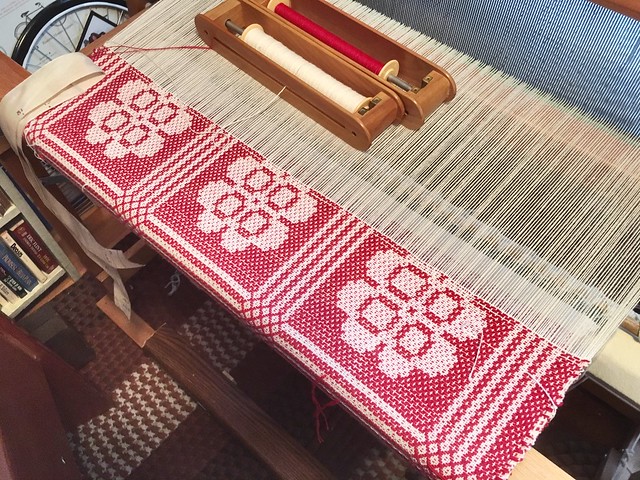
The tie-up I got back was do-able, but I had to check a cheat sheet for each block, because it wasn't a logical arrangement.
So, I was chatting with Hilary, a fellow student at the Multnomah Art Center, who is ALSO weaving a summer and winter project (summer and winter being the weave structure; we were both working from profile drafts, which are a shorthand way of describing a weaving design). She didn't have a cheat sheet taped to her loom.
Her tie-up was MUCH more logical, so I went home and changed the tie-up on my loom. No cheat sheet required. I can use this tie-up for every summer and winter weaving project I do going forward as well, which is a bonus. The tie up essentially mimics the profile block tie-up.
We are using 8 shaft looms, so the profile drafts we use can have up to 6 design blocks.
The algorithm (all credit to Hilary) is as follows:
tie
shaft 1 to treadle 1
shaft 2 to treadle 2
tabby b (usually shafts 3-8) to treadle 9
tie the pattern shafts in each block to the corresponding treadle, knowing that multiple blocks are lifted in each treadle.
So, here's treadles 3-8
| Profile Treadling | Pattern Shaft | |||||
| F | F | F | F | F | 8 | |
| E | 7 | |||||
| D | D | 6 | ||||
| C | C | C | 5 | |||
| B | B | B | 4 | |||
| A | A | A | A | 3 | ||
where
treadle 3 gets ABCF (shafts 6 and 7)*
treadle 4 gets AB (shafts 5, 6, and 7)
and so on
The draft is treadled in "Pairs X" fashion, and there are 8 picks for each row in the treadle diagram.
Here's a subset of the treadle diagram:
| 3 | 4 | 5 | 6 | 7 | 8 |
| 8 | |||||
| 3 | |||||
| 4 | |||||
| 4 | |||||
| 4 | |||||
| 5 | |||||
| 6 | |||||
| 6 | |||||
| 6 |
The treadling algorithm is 2-1-1-2, where the 1 and 2 mean that shaft 1 or 2 is to be included in the lift. Shafts 1 and 2 are lifted together to make Tabby A. The result is a little "X" in the fabric.
So, substituting the appropriate treadle, to complete treadling the 3,
| T+2 |
| 1+2 |
| T+1 |
| 9 |
| T+1 |
| 1+2 |
| T+2 |
| 9 |
where T=3.
Easy peasy. No cheat sheet.
* you MIGHT think that the tie-up for treadle 3 should be 3, 4, 5, and 8, rather than 6 and 7. And that's what they call "Tromp as writ". Which is all good for a SINKING shed loom; the tied shafts go down when the treadle is pressed. However, for a RISING shed loom (jack looms are rising shed; my loom is a jack loom; it is the most commonly available type of loom used in the USA, I think), one ties up the opposite treadles.

1 comment:
I was so surprised to see the pattern, I have got the exact same thing in the same colors on my loom
Post a Comment